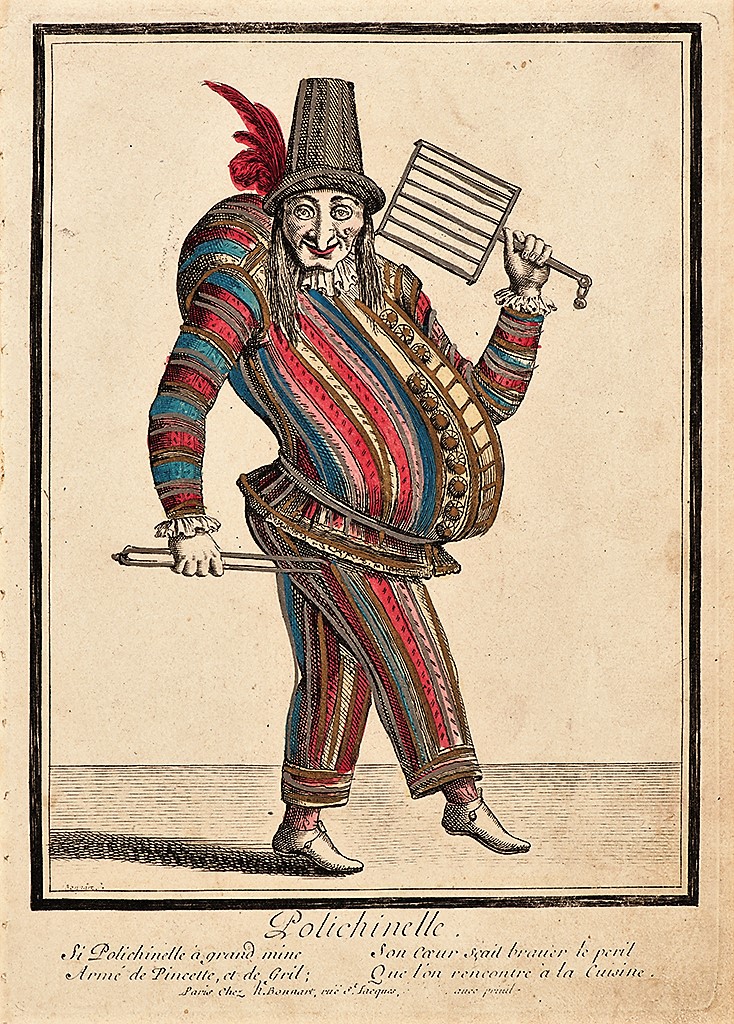
Polichinelle (circa 1680-90), by Nicolas Bonnart (1636-1718)
from Five Characters from the Commedia dell’Arte
credit: Open Access Image from the Davison Art Center, Wesleyan University (photo: M. Johnston)
The name Punch, which appeared in the late 17th century, denotes a grotesque, hook-nosed humpbacked buffoon, the chief male character in the puppet show now known as Punch and Judy show.
The phrase as pleased, or proud, as Punch, meaning extremely pleased, or proud, apparently refers to the fact that Punch is traditionally depicted with a self-satisfied grin on his face. This phrase is first recorded in the journal of Theobald Wolfe Tone (1763-98), an Irish revolutionary and one of the founding members of the United Irishmen; when he was in Paris in order to persuade the French government to send an expedition to invade Ireland, Tone wrote the following on 18th July 1796:
(1826 edition)
Called at twelve on Clarke. At last he has got my brevet from the Minister at War. It is for the rank of Chef de Brigade, and bears date the 1st Messidor. (June 19th.) It remains now to be signed by Carnot and Lagarde, which will be done to-day, and to-morrow, at nine, I am to pass muster. […] Clarke embraced me on giving me the brevet, and saluted me as a brother officer: so did Fleury, and my heart was so full, I could hardly reply to either of them. I am as proud as Punch. Who would have thought this, the day I left the Lough of Belfast?
The name Punch is an abbreviation of Punchinello, which dates back to the mid-17th century and is an alteration of Neapolitan Policinella (Italian Pulcinella), the name of a character in the commedia dell’arte.
This Neapolitan name is in turn probably a diminutive of pollicino, chick, Punchinello being characterised by a hooked nose and a croaking voice.
The noun pollicino is in turn from post-classical Latin pullicenus, of same meaning, from classical Latin pullus, which denoted a young animal, in particular a young fowl, a chicken.
Several French nouns are derived from Latin pullus:
– poussin, hatchling chick, is from pullicinus, an alteration of pullicenus;
– poule, hen, is from post-classical Latin pulla, feminine of pullus (French poulet, young hen, is a diminutive of poule and the origin of English pullet; cf. also English poultry, ultimately from poulet);
– poulain, colt, foal, perhaps through the post-classical form pullamen, is from pullus in the sense of young animal; the feminine of poulain, pouliche, means filly.
The French phrase fier comme un pou means extremely proud; its apparent literal signification is proud as a louse, but in fact, here, pou is a variant of Old French poul, meaning cock, rooster, from pullus.
The character named Punch or Punchinello in English is Polichinelle in French.
The French phrase un secret de Polichinelle means an open secret (a variant used to be un secret de la comédie).
The phrase avoir un polichinelle dans le tiroir, literally to have a Punchinello in the drawer, is the equivalent of to have a bun in the oven, meaning to be pregnant; a variant is avoir un polichinelle sous le tablier, under the apron. These French phrases might refer to Punchinello’s paunch or to the common origin of the name Polichinelle and the noun poussin, which is post-classical Latin pullicenus, meaning chick.

Thank you for these interesting posts.
“Proud as a louse” is very good. Have you ever looked into these:
— Drunk as a skunk
— High as a kite
— Happy as a clam
LikeLike
So far, only ‘happy as a clam’.
LikeLike